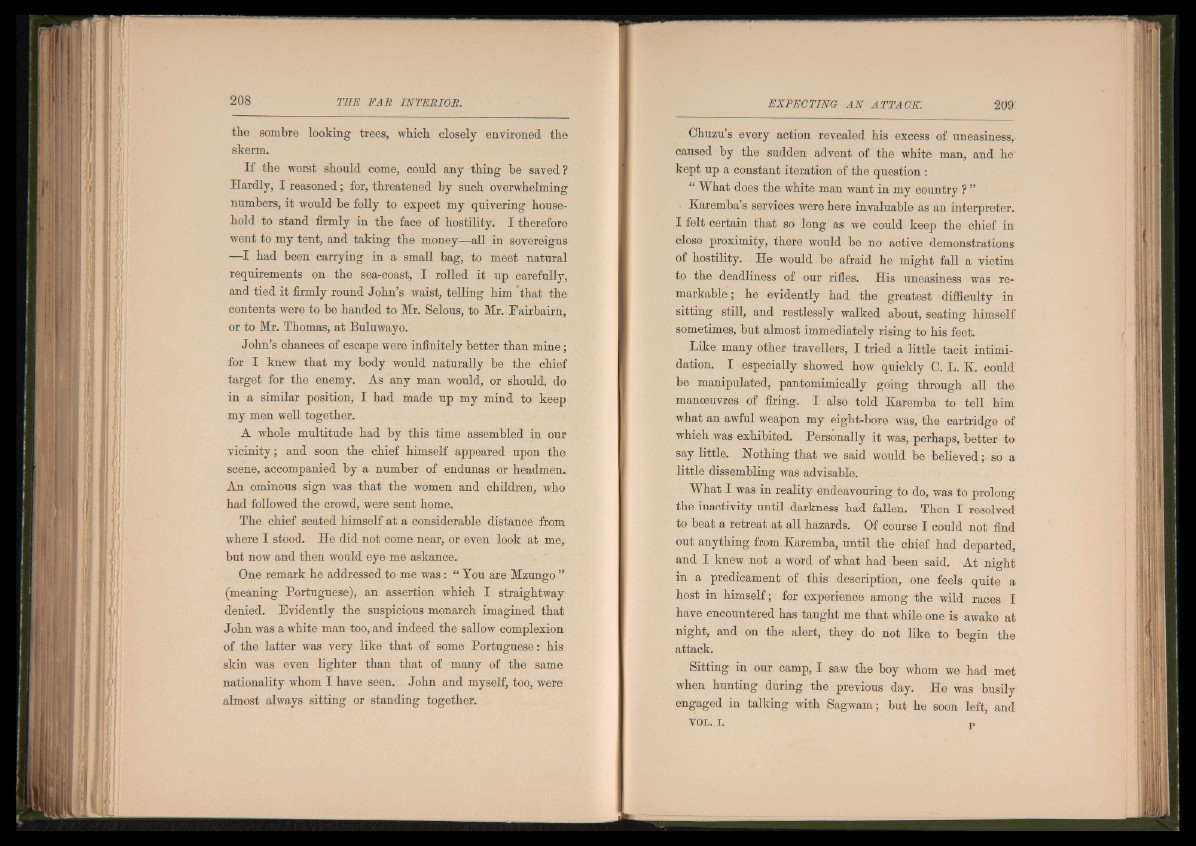
the sombre looking trees, which closely environed the
skerm.
If the worst should come, could any thing be saved?
Hardly, I reasoned; for, threatened by such overwhelming
numbers, it would be folly to expect my quivering household
to stand firmly in the face of hostility. I therefore
went to my tent, and taking the money—all in sovereigns
—I had been carrying in a small bag, to meet natural
requirements on the sea-coast, I rolled it up carefully,
and tied it firmly round John’s waist, telling him ‘that the
contents were to be handed to Mr. Selous, to Mr. Fairbairn,
or to Mr. Thomas, at Buluwayo.
John’s chances of escape were infinitely better than mine;
for I knew that my body would naturally be the chief
target for the enemy. As any man would, or should, do
in a similar position, I had made up my mind to keep
my men well together.
A whole multitude had by this time assembled in our
vicinity; and soon the chief himself appeared upon the
scene, accompanied by a number of endunas or headmen.
An ominous sign was that the women and children, who
had followed the crowd, were sent home.
The chief seated himself at a considerable distance from
where I stood. He did not come near, or even look at me,
but now and then would eye me askance.
One remark he addressed to me was : “ You áre Mzungo ”
(meaning Portuguese), an assertion which I straightway
denied. Evidently the suspicious monarch imagined that
John was a white man too, and indeed the sallow complexion
of the latter was very like that of some Portuguese: his
skin was even lighter than that of many of the same
nationality whom I have seen. John and myself, too, were
almost always sitting or standing together.
Ohuzu’s every action revealed his excess of uneasiness,'
caused by the sudden advent of the white man, and he
kept up a constant iteration of the question :
“ What does the white man want in my country ? ”
Karemba’s services were here invaluable as an interpreter.
I felt certain that so long as we could keep the chief in
close proximity, there would be no active demonstrations
of hostility. He would be afraid he might fall a victim
to the deadliness of our rifles. His uneasiness was remarkable
; he evidently had the greatest difficulty in
sitting still, and restlessly walked about, seating himself
sometimes, but almost immediately rising to his feet.
Like many other travellers, I tried a little tacit intimidation.
I especially showed how quickly C. L. K. could
be manipulated, pantomimically going through all the
manoeuvres of firing. I also told Karemba to tell him
what an awful weapon my eight-bore was, the cartridge of
which was exhibited. Personally it was, perhaps, better to
say little. Nothing that we said would be believed; so a
little dissembling was advisable.
What I was in reality endeavouring to do, was to prolong
the inactivity until darkness had fallen. Then I resolved
to beat a retreat at all hazards. Of course I could not find
out anything from Karemba, until the chief had departed,
and I knew not a word of what had been said. At night
in a predicament of this description, one feels quite a
host in himself; for experience among the wild races I
have encountered has taught me that while one is awake at
night, and on the alert, they do not like to begin the
attack.
Sitting in our camp, I saw the boy whom we had met
when hunting during the previous day. He was busily
engaged in talking with Sagwam ; but he soon left, and
VOL. % p